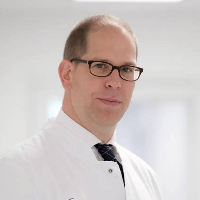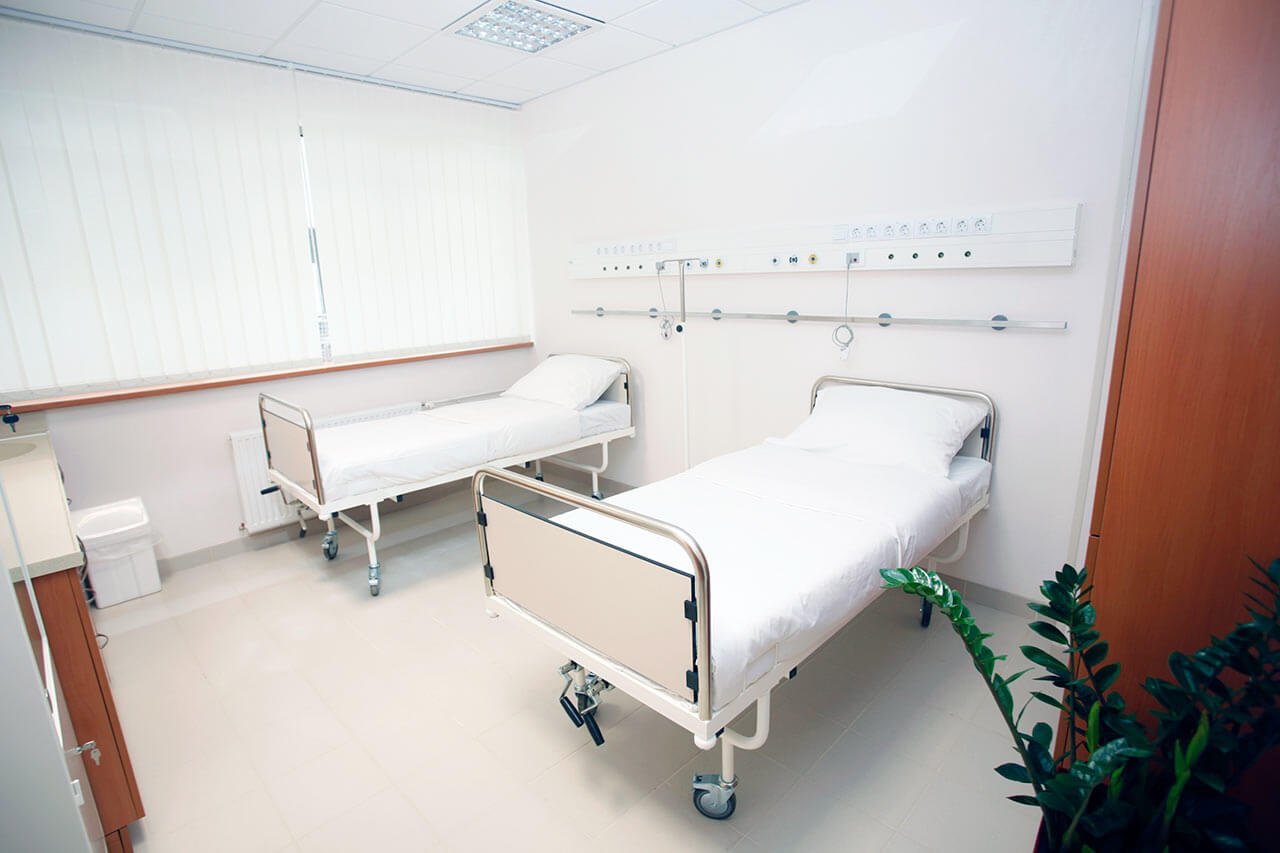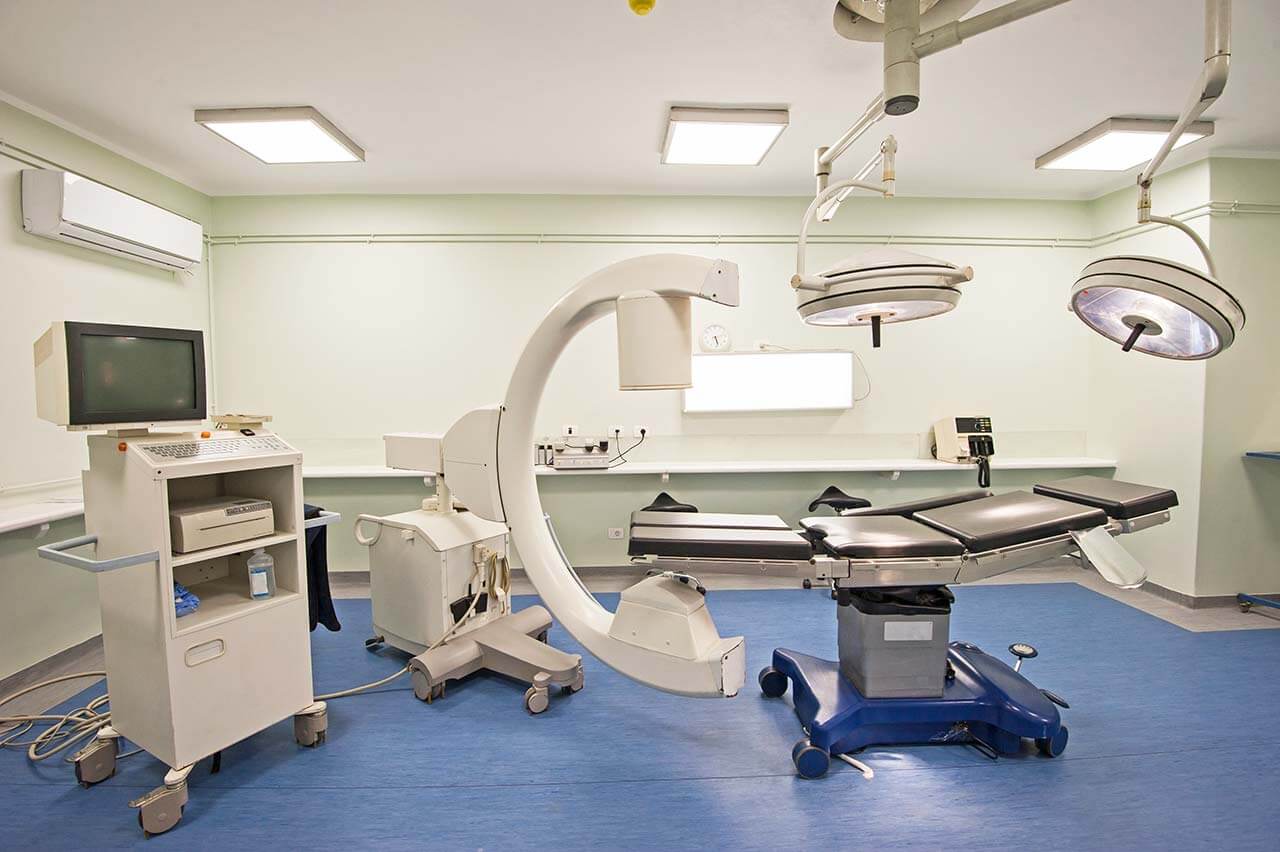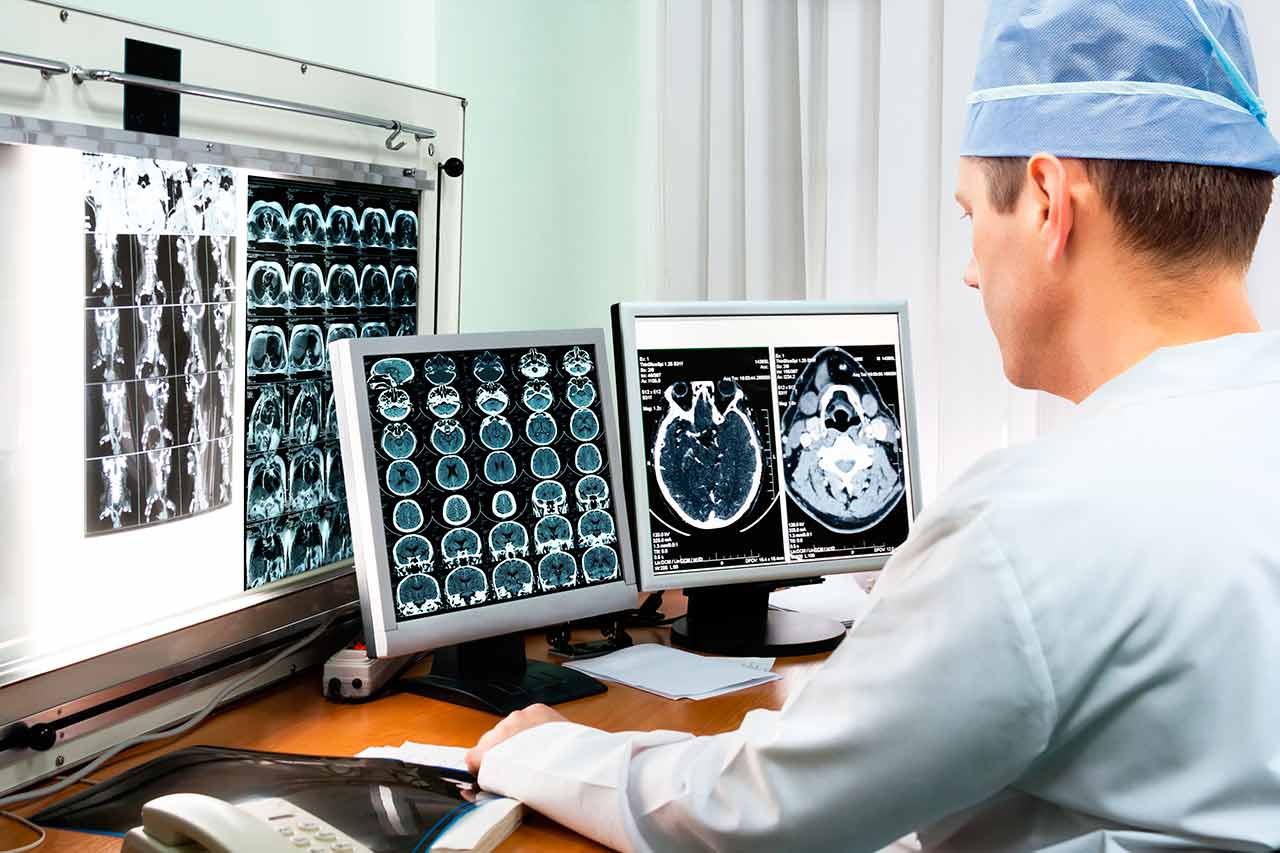
The program includes:
- Initial presentation in the clinic
- clinical history taking
- physical examination
- review of medical records
- laboratory tests:
- complete blood count
- general urine analysis
- biochemical analysis of blood
- TSH-basal, fT3, fT4
- tumor markers
- indicators of inflammation
- indicators blood coagulation
- abdominal CT/ MRI
ultrasound examination - the preparation according to preoperative standard
- surgery resection of the tumor
- histologically and immunohistochemically examination
of the remote tissues - symptomatic treatment
- control examinations
- the cost of essential medicines and materials
- nursing services
- full hospital accommodation
- explanation of future recommendations
Required documents
- Medical records
- MRI/CT scan (not older than 3 months)
- Biopsy results (if available)
Service
You may also book:
 BookingHealth Price from:
BookingHealth Price from:
About the department
According to Focus magazine, the Department of Adult and Pediatric Urology at the University Hospital Muenster ranks among the top German medical facilities specializing in the treatment of prostate cancer!
The department offers the full range of diagnostics and treatment of diseases of the kidneys, urinary tract, as well as male reproductive organs in children and adults. The specialization covers the treatment of dysfunctions, acute injuries and inflammation, as well as the correction of complex malformations and treatment of cancers of the genitourinary system and male reproductive organs. Thanks to the unique competence of doctors, the department guarantees the highest standards of conservative and surgical treatment of urological pathologies. The department is headed by Prof. Dr. med. Andres Jan Schrader, who, according to the Focus magazine, ranks among the top German urologists.
The special attention is paid to the use of minimally invasive surgical procedures, which contribute to the rapid recovery of patients, minimal pain and risks of postoperative complications. Many operations are performed using the da Vinci surgical system, laser technology. Such interventions are distinguished by high accuracy and the best possible preservation of healthy tissues and nerve endings. The department's surgeons have vast experience in the field of robotic surgery and practice such operations even in complex clinical cases.
Special emphasis should also be maid on the treatment of urological diseases in children. Pediatric urologists mainly deal with the treatment of urinary tract malformations and various diseases of the kidneys, ureters, bladder, urethra and male external reproductive organs in newborns and children. Particular attention is paid to the comprehensive counseling, informing patients and their parents about the necessary diagnostic and therapeutic measures, the benefits of a particular treatment method. The treatment of children is provided in close interdisciplinary cooperation with the experts in the field of pediatrics, pediatric nephrology, pediatric radiology, nuclear medicine, etc. Many interventions for the treatment of urological pathologies in children are carried out on an outpatient basis.
The service range of the department includes:
- Robotic minimally invasive surgery (da Vinci surgical system)
- Interventions to treat prostate cancer
- Interventions on the bladder (cystectomy with urinary diversion in bladder cancer)
- Ureter implantation in severe stenosis
- Sparing and radical interventions on the kidneys and upper urinary tract (benign and malignant tumors)
- Renal pelvis plastic surgery in stenosis
- Adrenal surgery (adrenalectomy) in benign or malignant adrenal tumors
- Minimally invasive removal of residual tumors after chemotherapy in patients with metastatic testicular tumor
- Reconstructive oncology, for example, the creation of an orthotopic urinary diversion (formation of the bladder from the ileum in men and women)
- Multimodal interdisciplinary treatment of advanced cancers
- Minimally invasive treatment of benign prostatic hyperplasia
- Enucleation using thulium and holmium laser
- Bipolar resection
- Vaporization of the prostate
- All methods for the diagnostics and treatment of urolithiasis
- Ultrasound diagnostics using high-tech devices
- Digital X-ray examinations
- Ultrasound- and radiological-guided stone fragmentation (Siemens Lithoskop)
- Ultrafine, flexible ureterorenoscopy (4.9Ch=1.7mm)
- Ultrafine, semi-rigid ureteroscopy (6,4Ch=2 mm)
- Mini-percutaneous nephrolithotripsy (mini-PCNL)
- Holmium laser therapy
- Analysis of health in patient with urolithiasis (in collaboration with one of the largest Centers of Excellence in this field)
- Diagnostics and treatment of urinary incontinence in men and women
- TOT and TVT sling procedures
- Open and laparoscopic Burch or Marshall-Marchetti-Krantz colposuspension
- Transobturator male sling (AdVance XP®)
- Implantation of the ATOMS® adjustable transobturator male system
- Implantation of an artificial sphincter in men (AMS 800®)
- Bladder/pelvic stimulator implantation (sacral neuromodulation) in urinary incontinence and chronic pain
- Botox injection in the bladder
- Hydrodistention and fulguration of the bladder
- EMDA® technique
- Ultrasound-, MRI-guided prostate fusion biopsy
- Systemic therapy in male reproductive system cancer
- Treatment within the international clinical trials
- Diagnostics and treatment of urological diseases in children
- Diagnostics
- Ultrasound examinations
- Bladder pressure measurement (urodynamic diagnostics)
- Uroflowmetry
- Miktsionny cystourethrography
- Excretory urography
- Renal scintigraphy (MAG III/DMSA)
- Cystoscopy
- Outpatient surgery
- Circumcision (including with foreskin preservation)
- Preputiolysis, frenulotomy (non-extensive foreskin correction)
- Orchiopexy (undescended testicle repair)
- Resection in hydrocele
- Varicocele correction
- Separation of the labial fusion
- Diagnostic urethrocystoscopy (cystoscopy)
- Diagnostics and treatment of diseases of the external genital organs
- Hydrocele
- Cryptorchidism (undescended testicle)
- Hypospadias (wrong location of the urinary tract opening)
- Pediatric varicocele (varicose veins of the scrotum)
- Labial fusion
- Penile torsion/deviation
- Meatal (urethral opening) stenosis
- Acute scrotal pain (of various origins)
- Buried penis
- Phimosis (foreskin narrowing)
- Diagnostics and treatment of diseases of the lower urinary tract
- Vesicoureteral reflux
- Ectopia of the urethral opening (location of the opening in wrong place with possible urinary incontinence)
- Urethral valves
- Urethral stenosis
- Bladder diverticulum (bladder protrusion)
- Small bladder volume
- Megacystis (enlarged bladder)
- Diagnostics and treatment of diseases of the upper urinary tract
- Kidney stones
- Renal pelvis outflow stenosis
- Kidney dysfunction
- Diagnostics and treatment of urination disorders
- Nocturnal enuresis
- Diurnal enuresis
- Neurogenic disorders of bladder emptying
- Diagnostics
- Other medical services
Curriculum vitae
- 1992 - 1999 Study of Medicine at the Hannover Medical School, Hannover.
- 1999 - 2000 Research Fellowship at the Helmholtz Centre for Infection Research (HZI) in Braunschweig.
- 2000 - 2002 Assistant Physician, Abdominal Surgery, Municipal Hospital Braunschweig.
- 2002 - 2010 Assistant and Senior Physician in the Department of Adult and Pediatric Urology at the University Hospital Marburg.
- 2010 - 2014 Leading Senior Physician and Deputy Head of the Department of Urology at the University Hospital Ulm.
- Since 01.08.2014 Head of the Department of Adult and Pediatric Urology at the University Hospital Muenster.
Clinical Focuses
- Surgical and conservative urologic oncology (in particular renal cell carcinoma, prostate cancer, urothelial carcinoma of the bladder).
- Robot-assisted surgical techniques.
- Minimally invasive therapy of prostate hyperplasia (for example, laser enucleation in benign prostate hyperplasia).
Research Focuses
- Study of changes in the signal transduction pathway as a cause of the development and progression of renal cell carcinoma.
- Investigation of mutations and posttranscriptional modifications of the androgen receptor in patients with prostate cancer.
- Clinical studies on prognostic markers of various urologic cancers.
Photo of the doctor: (c) Universitätsklinikum Münster
About hospital
According to the Focus magazine, the University Hospital Muenster ranks among the top German hospitals!
The hospital belongs to the most prestigious medical institutions in Germany. The hospital is distinguished by a high professionalism of its doctors, state-of-the-art technological equipment and the availability of the most advanced diagnostic and therapeutic capabilities ensuring the first-class medical services. The hospital integrates more than 30 specialized departments, as well as numerous institutes and centers, thus representing all the specialties of modern medicine. The hospital treats more than 64,000 inpatients and 500,000 outpatients every year, which is an indisputable evidence of the highest quality of medical services.
The medical team of the hospital, consisting of more than 10,000 employers, is committed to preserving the physical health of patients, providing them with psychological support and compassionate attitude throughout the entire therapeutic process.
The hospital has succeeded in all specialties of medicine, however, main areas of its specialization include oncology, treatment of cardiovascular, neurological diseases, transplant medicine, psychiatry and psychosomatics, pediatrics with a special focus on rare diseases in children, traumatology, orthopedics, prenatal medicine, and reproductive medicine. In addition, key importance is given to scientific research and training of medical students, so that the specialists of the hospital make a momentous contribution to the development of medicine as a whole.
Photo: (с) depositphotos
Accommodation in hospital
Patients rooms
The patients of the University Hospital Muenster live in single or double rooms. The rooms are made in bright colors and modern design. Each room has an ensuite bathroom with shower and toilet. The standard room includes an automatically adjustable bed, a bedside table, a table and chairs for receiving visitors, a telephone and a TV. The hospital offers access to the Internet. If desired, the patient can also stay in the enhanced-comfort room.
Meals and Menus
The patients of the hospital are offered a tasty and balanced three meals a day: breakfast, lunch and dinner. The menu always features diet and vegetarian dishes. If for any reason you do not eat all the food, you will be provided with an individual menu. Please inform the medical staff about your dietary preferences prior to the treatment.
Further details
Standard rooms include:
Religion
Religious services are available upon request.
Accompanying person
During the inpatient program, an accompanying person may stay with you in a room or at the hotel of your choice.
Hotel
During the outpatient program, you can live at a hotel of your choice. Managers will help you to choose the most suitable options.
The hospital offers a full range of laboratory tests (general, hormonal, tests for infections, antibodies, tumor markers, etc.), genetic tests, various modifications of ultrasound scans, CT scans, MRI and PET / CT, angiography, myelography, biopsy and other examinations. Treatment with medications, endoscopic and robotic operations, stereotaxic interventions is carried out here, modern types of radiation therapy are also used. The hospital offers patients all the necessary therapeutic techniques.
- Stereotactic radiotherapy, including intracranial one
- Thulium and holmium laser enucleation of the prostate
- HIPEC for peritoneal cancer
- Imlantation of mechanical heart support systems
- Assisted reproductive technologies
These are arthrosis and sports injuries of the joints, benign neoplasms and malignant tumors of various localizations, spinal injuries, osteoporosis, benign prostatic hyperplasia, urolithiasis, inflammatory bowel disease and other pathologies.
- Traumatology and hand surgery
- Urology
- General and abdominal surgery
- Cardiology and cardiac surgery
- Obstetrics and gynecology
The hospital's team consists of more than 10,000 highly qualified employees.






